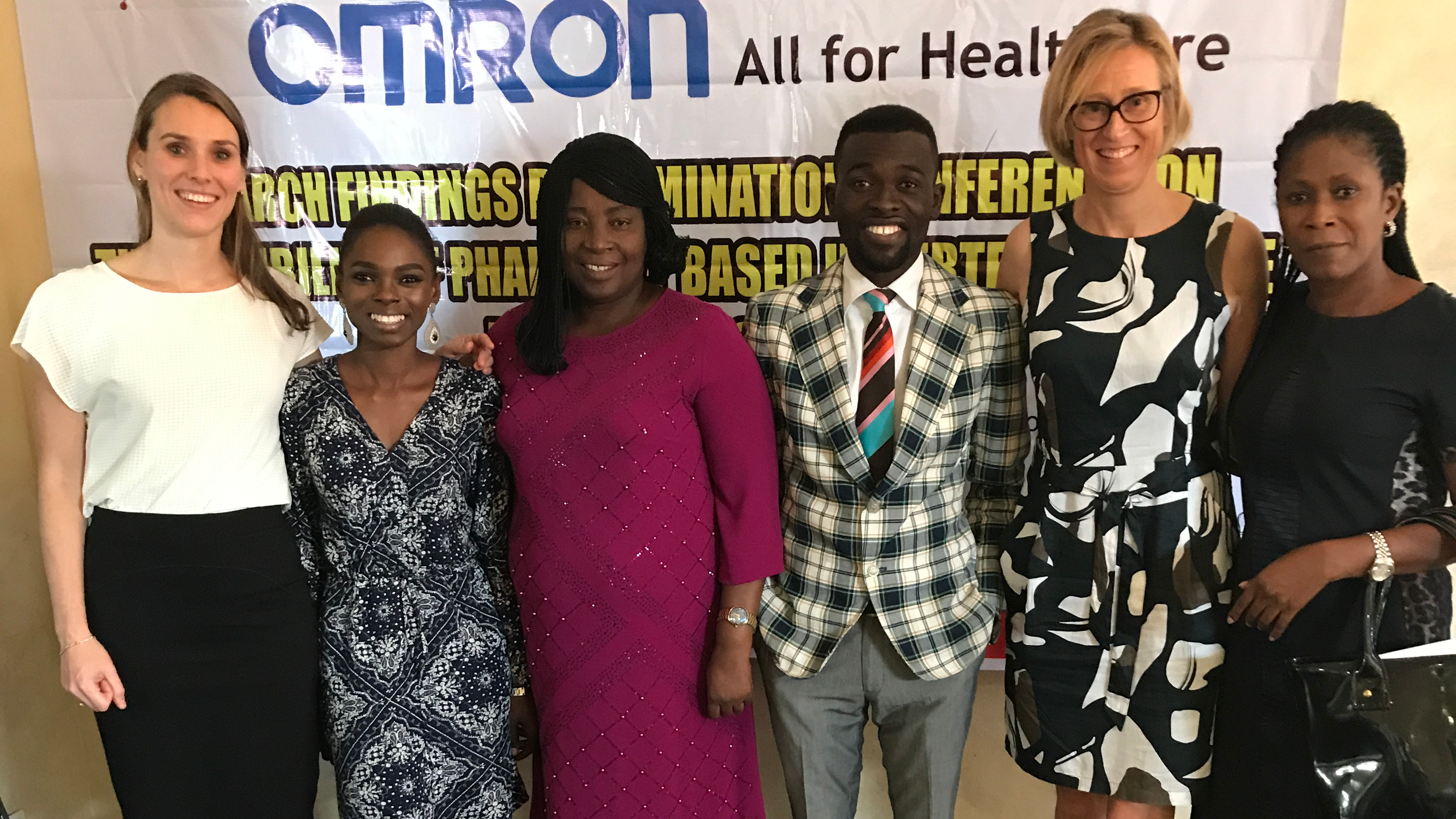
14 Mar Shared language, willingness to learn new approaches key to multidisciplinary project’s success
A diverse project team has proven that an open mind to new approaches and developing common concepts can go a long way to ensuring the success of a study.
Members of Amsterdam Institute for Global Health and Development (AIGHD), which includes several faculty members from the University of Amsterdam and Amsterdam UMC, were approached by OMRON Healthcare Europe with a request to evaluate a pilot care model project that used a mobile phone application to remotely monitor patients with high blood pressure in Nigeria. In addition valuable contributions from implementing partners which included a local partner in Nigeria, CEHD Lagos, the team also boasted members from the Faculty of Social and Behavioral Sciences, Department of Global Health (Amsterdam UMC) and Department of Vascular Medicine along with AIGHD academic staff and PhD students and members of the Amsterdam UMC Medical Information Sciences group.
While working across disciplines may seem simple in concept, there were a number of factors the team had to work through.
“Making a multidisciplinary collaboration work in practice can be challenging because people often struggle to transcend their own disciplines and tend to fall back on their own knowledge, approaches and jargon,” said UvA anthropologist Rene Gerrets.
“Developing common concepts, using shared language, learning one another’s way of approaching and examining problems and being open to different methodological approaches were key to the success of our collaboration on the project.”
Access to quality hypertension care is limited in Sub-Saharan Africa and oftentimes, patients connect directly with trusted pharmacy staff to access medications without the involvement of a cardiologist. The project sought to test a care model where patients were remotely monitored by a cardiologist who worked in partnership with their local pharmacists.
“We knew we could quantitatively measure changes in blood pressure and patient visits, for example, but some of those numbers would have been difficult to interpret without knowing the reasons behind them,” said Department of Global Health assistant professor Anja van’t Hoog and project lead from AIGHD.
Rene’s expertise both as a medical anthropologist and Africanist provided crucial insight and leadership from a qualitative perspective.
“The social science perspective was incorporated to guide the design of the study in a socially, culturally and societally acceptable way and also to ensure data that may have seemed less relevant was captured to help interpret findings for the final papers,” said Rene. “The multidisciplinary approach really allowed us to discover unanticipated connections and factors and better understand how these may be linked to the findings we observed.”
Collaboration key to study success
As part of the project, PhD candidate Lianne Cremers, who entered the project as a PhD candidate and defended her thesis during the writing stage, trained local researchers to collect the qualitative data. A team of research assistants was also trained by project team that included Dr. Okwor, study coordinator in Lagos, and AIGHD junior researcher and PhD candidate Heleen Nelissen to collect the quantitative data. The group regularly connected with the researchers and assistants to facilitate ongoing mentorship throughout the project.
Importantly, the model demonstrated remote monitoring in Sub-Saharan Africa may be an effective approach to helping patients better manage their high blood pressure.
“The multidisciplinary approach helped us to better understand the discrepancies in the data, for example, disparities between the frequency of visits and what was entered into the app. By including qualitative feedback from the pharmacists, we developed a list of explanations which made perfect sense. Ultimately, this diverse collaboration was very complimentary and enabled us to develop a complete picture of the findings,” said Anja.
Three papers were published on the study, which recently wrapped up, including two mixed-methods papers and a quantitative study:
Photo caption: (L-R): Heleen Nelissen (AIGHD), Adebisi Ademakin (Centre for Epidemiology and Health Development), Afolabi Oluwatola (Centre for Epidemiology and Health Development), Sulaimon Goodluck (Centre for Epidemiology and Health Development), Anja van’t Hoog (AIGHD) and Victoria Yesufu (Centre for Epidemiology and Health Development).
The entire project team included:
AIGHD/Amsterdam UMC: Anja van’t Hoog1,2, Heleen Nelissen1,2, Sam Kool2, Frank van Leth1,2, Lizzy Brewster1,2, Marleen E. Hendriks8, Constance Schultsz1,2
AIGHD/UvA: Rene Gerrets2,3, Lianne Cremers2,3,4
CEHD Lagos: Tochi Okwor5,6, Abiola Alege5, Akin Osibogun5,7, Olalekan Makinde7, Oluyemisi Khalidson5
Affiliations and addresses:
1 Amsterdam UMC, University of Amsterdam, Department of Global Health, Meibergdreef 9, Amsterdam, the Netherlands
2 Amsterdam Institute for Global Health and Development, Paasheuvelweg 25, Amsterdam, the Netherlands
3 University of Amsterdam, Department of Anthropology, Nieuwe Achtergracht 166, Amsterdam, the Netherlands
4 Amsterdam UMC, University of Amsterdam, Center of Tropical Medicine and Travel Medicine, Department of Infectious Diseases, Division of Internal Medicine, Meibergdreef 9, Amsterdam, the Netherlands
5 Centre for Epidemiology and Health Development, Ibeju, Lekki, Lagos, Nigeria
6 Department of Community Health, University of Nigeria Teaching Hospital Enugu, P.M.B. 01129 Enugu, Nigeria
7 Department of Community Health, Lagos University Teaching Hospital, Idi-Araba, Lagos, Nigeria
8 Joep Lange Institute, Paasheuvelweg 25, Amsterdam, the Netherlands
